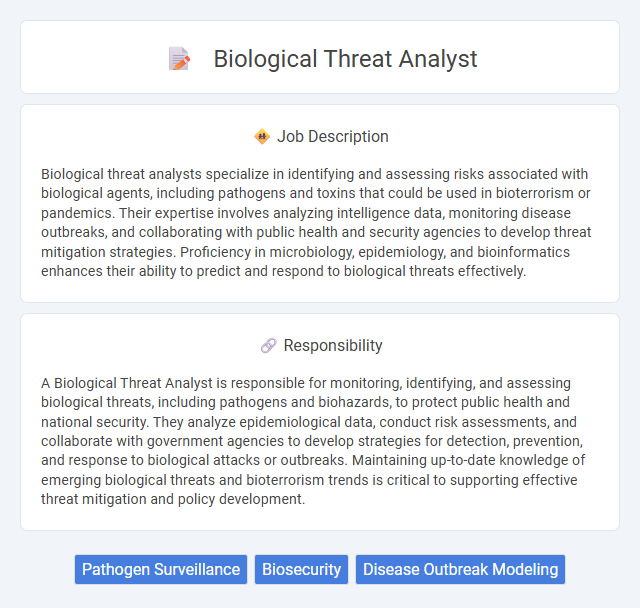
Biological threat analysts specialize in identifying and assessing risks associated with biological agents, including pathogens and toxins that could be used in bioterrorism or pandemics. Their expertise involves analyzing intelligence data, monitoring disease outbreaks, and collaborating with public health and security agencies to develop threat mitigation strategies. Proficiency in microbiology, epidemiology, and bioinformatics enhances their ability to predict and respond to biological threats effectively.
Individuals with strong analytical skills and a background in biology or related sciences are likely to be well-suited for a Biological Threat Analyst role. Candidates who demonstrate attention to detail, critical thinking, and the ability to interpret complex data may have a higher probability of success in identifying and assessing biological threats. People who experience high stress or prefer less technical work might find this job challenging and potentially unsuitable.
Qualification
A Biological Threat Analyst requires expertise in microbiology, bioinformatics, and epidemiology to assess and mitigate risks posed by biological agents. Strong analytical skills and experience with data modeling, pathogen detection technologies, and biosurveillance systems are essential. Advanced degrees in biological sciences, public health, or biodefense alongside security clearances enhance qualifications for this role.
Responsibility
A Biological Threat Analyst is responsible for monitoring, identifying, and assessing biological threats, including pathogens and biohazards, to protect public health and national security. They analyze epidemiological data, conduct risk assessments, and collaborate with government agencies to develop strategies for detection, prevention, and response to biological attacks or outbreaks. Maintaining up-to-date knowledge of emerging biological threats and bioterrorism trends is critical to supporting effective threat mitigation and policy development.
Benefit
Biological threat analysts likely enjoy competitive salaries and opportunities for career advancement in government or private sectors. Access to cutting-edge technology and specialized training often enhances professional skill sets and job satisfaction. The role probably offers a sense of purpose, contributing to public safety and global health security.
Challenge
Biological threat analysts likely face the challenge of interpreting vast amounts of complex biological data under tight time constraints to identify emerging threats accurately. The role probably demands staying current with rapidly evolving pathogens and biotechnologies, which can complicate risk assessments. Uncertainty in threat sources and potential impacts may require analysts to make probabilistic judgments with incomplete information.
Career Advancement
A Biological Threat Analyst specializes in identifying and assessing risks posed by biological agents, utilizing expertise in epidemiology, bioinformatics, and biodefense strategies to protect public health and security. Career advancement opportunities in this field include roles such as Senior Biological Threat Analyst, Biosurveillance Program Manager, and Director of Biosecurity, often requiring advanced degrees and certifications in public health, microbiology, or homeland security. Continuous skill development in data analysis, crisis response, and interagency collaboration significantly enhances prospects for leadership positions within government agencies, private sector biosecurity firms, and international health organizations.
Key Terms
Pathogen Surveillance
Biological threat analysts specializing in pathogen surveillance monitor infectious agents to detect emerging biological risks and assess potential outbreaks. They utilize genomic data, epidemiological trends, and bioinformatics tools to identify mutations and transmission patterns of viruses and bacteria. Their work supports public health responses and informs biodefense strategies crucial for mitigating biological threats.
Biosecurity
Biological threat analysts specialize in identifying and assessing risks related to biological agents that could impact public health and national security. They analyze data on infectious diseases, bioterrorism activities, and emerging biosecurity threats to develop strategic responses and mitigation plans. Expertise in bioinformatics, epidemiology, and biodefense protocols is essential for effective threat detection and prevention.
Disease Outbreak Modeling
A Biological Threat Analyst specializing in Disease Outbreak Modeling employs advanced epidemiological data and computational simulations to predict the spread and impact of infectious diseases. This role involves analyzing pathogen transmission patterns, host susceptibility, and environmental factors to inform public health strategies and containment measures. Expertise in statistical modeling, bioinformatics, and real-time data integration is critical for accurately forecasting outbreak scenarios and supporting decision-making during biological threat events.
 kuljobs.com
kuljobs.com